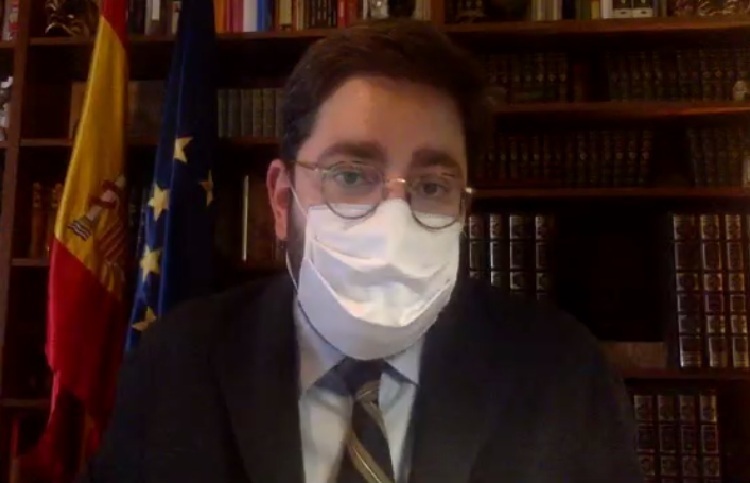Eduardo González
The Secretary of State for Global Spain, Manuel Muñiz, assured yesterday that the Government’s foreign policy corresponds to the President and the Minister of Foreign Affairs, although he admitted that the Executive is frequently forced to “clarify its positions” in this regard because of the frequent statements of the Second Vice President, Pablo Iglesias, on this matter.
“In a coalition government, the political parties that constitute it do not disappear and, sometimes, they give their opinion as parties, not as members of the government”, Muñiz declared during her speech at the seminar Presentation and debate on the draft of the MAEC’s New Foreign Policy Strategy, the first public event of the recently constituted Spanish Foreign Policy Association (APEE), organized in collaboration with the Royal University Institute of European Studies of the CEU San Pablo University.
“There has been a lot of recurring back and forth about Pablo Iglesias’ statements and about whether he is the one who makes foreign policy”, but “those who shape foreign policy are the President of the Government (Pedro Sánchez) and the Minister of Foreign Affairs (Arancha González Laya)“, because “in foreign policy what is important is who can make the statements and commit on behalf of Spain, who has the signature of Spain, and it is very clear who can do that”, he continued. “The rest is part of the dynamics of a coalition government, because it is not reasonable to ask that the two parts of it be diluted, even if that forces us to do the exercise of clarifying what the government’s positions are in foreign policy“, he added.
During the event, which was moderated by the president of the APEE and former PP deputy José María Beneyto, the Secretary of State set out the general lines of the Government’s Foreign Action Strategy 2021-2024, which the minister will present this coming Thursday before the Foreign Affairs Committee of Congress and which the Council of Ministers hopes to be able to approve at the beginning of March, after passing through both Houses.
According to Muñiz, the main objective of the Strategy is “to respond to the question of what Spain should do” in the face of an international order characterized by “the weakening of the liberal international architecture”, a process in which the COVID-19 pandemic has acted as an “accelerator of some previous fractures and tendencies”. “Spain is called to defend an open, integrated and democratic international order” and the four main lines of action of the Strategy (human rights, democracy, feminism and diversity; global, fair, integrated and equitable social economy; more sustainable and green planet; and regional and European integration and reinforcement of multilateralism) “are called to respond to the sources of global institutional collapse”.
López Garrido warns of Spain’s loss of political influence in Ibero-America
For his part, the vice president of the APEE and vice president of the Alternativas Foundation, Diego López Garrido, lamented during one of his speeches the “loss of political influence of Spain in Ibero-America in Spanish foreign policy” in contrast to “the very important presence of Spain in Ibero-America from an economic point of view”.
“Spain is a major investor in Ibero-America, it is the great reference, and for many countries the first reference, in terms of investments; however, that importance does not correspond to a political presence”, continued the former Secretary of State for the EU during the government of José Luis Rodríguez Zapatero (PSOE). “The Ibero-American Summits have become blurred and should recover their vigor to put the political presence of Spain at the same level as the economic one”, a task in which “the Ministry of Foreign Affairs has much to do, because it is the key Ministry to give more impetus to the prominence of Spain in the Ibero-American world”, he concluded.
For her part, Cristina Manzano, director of Esglobal and journalist for the newspaper El País, stressed that one of the great virtues of the Foreign Action Strategy is the defense of a feminist foreign policy, “one of the most controversial bets” but which is basic to “achieve equality”. “Spain is already recognized as an important player in the international arena in this field, but we do not boast enough about it”, she added.
The other mainstay of the Strategy, she continued, is “the safeguarding of the planet and the ecological transition”, which, she added, is “fundamental for having a prominent role in certain forums”. In contrast to these virtues, the two great “risks” of the Strategy are that “everything remains a nice exercise in rhetoric and reflection that does not come out of this bubble” and that foreign policy “is used to deepen political polarization” in Spain.







